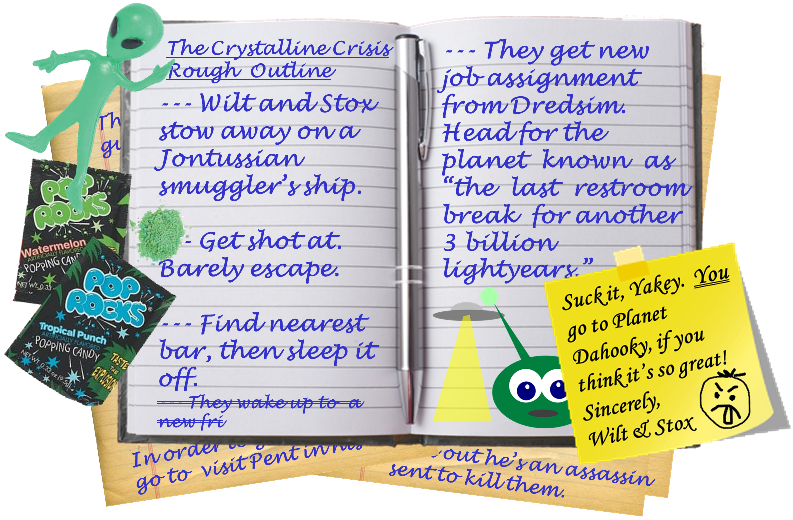“You Be You!”: Letting My Characters Do What They Want, for the Most Part



Why do I let them do this? Because it’s better than sitting there with a raging case of writer’s block, that’s why.
Have you ever tried to reason with a 2-year-old? It doesn’t usually work out in your favor, does it? It’s frustrating and ultimately exhausting. Well, I find sometimes that dealing with characters you’ve created in your head—entities you’d assume are a lot more controllable than a living, breathing person—is like that. They want what they want, and no amount of witnessing your forehead-vein popping out is going to change their mind.
Now, 2-year-olds have no qualms about hurling themselves onto the floor in the main aisle of Walgreens and throwing a total hissy because you won’t put that bag of gummy bears in the cart. Story characters, however, like to haul off and punch each other in the middle of a conversation or suddenly reveal a deep, dark secret to the reader just before they shove their beloved Firebird into gear and barrel towards the edge of a cliff. And all of this happens while the wide-eyed writer is poised in front of the computer, as if watching a movie, fingers still moving over the keyboard, stammering, “Wait, what?!”
The primary difference, I would say, is that while you still might be able to threaten the 2-year-old with a week-long ban on Peppa Pig, story characters typically have more refined tastes and an alarming lack of vulnerability. What are you gonna hold over their heads? Warnings about writing them a new fetish for funny hats, hoping the humiliation will be enough to make them stop generating an evil subtext in everything they do? Not letting them even get to second base with the woman they’ve been chasing for 150 pages, because they just refuse to deliver those great punchlines you’ve been slaving over for the sake of comic relief? You’d have a full-blown Fictional Characters’ Guild strike on your hands, which could very well bring your Make-a-Story Machine to a grinding stop. I’m telling you, people: No leverage. As a writer, you usually have to accept that you are going to embark upon a journey which will frequently put you knee-deep in the unknown. Oh yes, you’ll think you know stuff. But you don’t. And that, my friends, is literary magic.
As a general rule, I determine how I want my stories to go. I dictate what I want the characters to do and why they should do it. But oftentimes, that and fifty cents get me a nice warm cup of “Go f*@k yourself.” I could even lay down the world’s best outline (though I usually don’t, when I first start a project, since it still smacks to me of diagramming or “fish-boning” a sentence, which is a traumatic relic of my English Major past), but when it comes to corralling my characters into that nice organized view of the world, they only cooperate to a certain extent. I cannot tell you the number of times a romantic interlude has occurred between characters who should never have looked twice at one another or when people who should have remained the best of friends throughout their lives are suddenly torching each other’s houses and declaring a blood feud. I can structure the narrative, but I can’t always control it, thanks to that double-edged sword of well-developed character personalities.
So there comes a point at which I have no choice but to throw up my hands and let them have at it. Because in 9 out of 10 cases, it produces a surprising but gratifying re-write of what I’d originally envisioned. And because if I force a particular fate upon my characters, they often resent me for it. The result is that I end up watching my own creations—my own lovingly and faithfully nurtured offspring—flip me the bird and storm off. And no matter how much I bitch or beg, I won’t get a decent chapter out of them for a couple of weeks afterwards.
I even try peace offerings, knowing how much one of them loves to indulge in a dirty puns scene or how much another gets off on sticking his gun in someone’s face, but all of it is to no avail. I put them in a situation that I think they’ll enjoy, making every effort to bribe them into behaving, and they just stand there and stare at each other. (And I know for a fact that they’re wordlessly giving each other hand signals that equate to “Let’s see how long it takes before she loses it again and starts slamming her laptop lid open and closed, ranting about killing us all off until she finally succumbs to a Doritos-induced coma, despondently watching ‘Tiny Hamster’ videos on YouTube.”)
But mercifully, there is a nexus, where the most critical elements of a story connect and overlap, transcending all petty squabbles between writer and invented protagonist so that the inherent goal remains intact: Do what’s best for the story.
If the integrity of the tale is jeopardized and the plot will undoubtedly fall apart because of a heroine’s whimsical decision to depart wildly from the basic storyline, then I will shut a bitch down faster than a Kardashian can take a selfie. But if a character, in the heat of the moment, says or does something to put a magnificent long-awaited crack in that psychological wall she’s been building since chapter one, and I didn’t see it comin’ . . . then that’s pure poetic gold, and I will toss her the keys to the kingdom right then and there, go grab a bucket of popcorn, and wait to see what happens next. I think it’s that intrinsic acceptance of “the greater good” that writers and their characters share. It’s the understanding that both parties want that creative universe to be the absolute best version of itself. Both want the narrative to matter, for the events to make sense, for the emotional impact to be genuine. And that takes compromise.
I’ve learned when to stand my ground and when to surrender. And I think—perhaps naively—that my characters know when to do the same. But overall, if you’ve developed them well, then you should trust them. Usually, they know their story better than you do, and it’s a little presumptive to think you can shape everything just because you had a rough idea of what their world would be like, when you first had the thought flit through your head one night halfway through The Blacklist.
I can’t deny that I love that sort of hyper-euphoric state that a writer can reach when a story is hitting on all cylinders. It truly borders on an out-of-body experience when you float above it all, seeing the characters walking and talking all on their own. It’s nothing short of blissful. And as long as they occasionally take a little dose of discipline from me and not give me sh*t about it, then I’ll buy them all the Walgreens gummy bears they want.
12 Comments
-
-
Melissa
Oh the perils and pitfalls of writers and their characters! Enjoyed this, Karen. You are a funny lady! ?
-
Christianne
This was fantastic! Again, I couldn’t stop laughing. 🙂 Thanks for giving us a glimpse into the “making of your characters”. I’m giving you a major high five / two thumbs up – – no flipping the bird from me! LOL!
-
Beck
Once again, true, glorious insight into Karen-brain. I hope the characters of your latest aren’t in cahoots with each other to see how many times they can get you to crack open chapter one. I imagine there’s a betting pool & Morgan’s winning…
-
Jean-Pierre Metereau
“Fishboning a sentence…” That sounds like the weirdest perversion ever, known only to degenerate English majors…
I enjoyed your post, and thought about what Vladimir Nabokov, who was a total control freak and never, according to him, let his characters take over, would say. -
Nashwa A Shalaby
This one is my favorite. Thank you.





Juan
Interesting reading. Thanks for sharing. I’d ratchet back on the IPAs for awhile and stick with domestic beers.